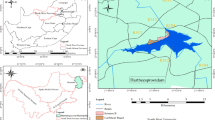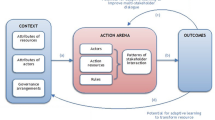Abstract
We are living in the ‘plasticene’ era. Marine plastic pollution is a global problem, and increasing effort and funds are being invested towards identifying and implementing solutions. It is well accepted that the implemented solutions should take into account local specificities and culture, which requires the involvement and engagement of local decision-makers and key actors. This paper presents how the DeCyDe-4 method, which is based on a participatory decision-support concept, was implemented to develop community-based policy tools and action plans to combat marine litter. Through a presentation of the step-by-step implementation of the method at a 3-day workshop in the Paphos District of Cyprus, the DeCyDe-4 method is unfolded so as to showcase how a multi-disciplinary group of local stakeholders can co-create a Policy Tool, and identify and prioritize measures and solutions to marine litter. The case study shows that DeCyDe-4 can support a varied group of stakeholders to negotiate a complex environmental problem such as marine litter, and to make informed, unbiased decisions, through a process that encourages active participation and dialogue, so that opposite opinions are heard, consensus is reached and ownership of the solutions is achieved.
Graphic abstract





Similar content being viewed by others
References
Bangert D, Schubert E, Fabian D (2014) A spiral model of musical decision-making. Front Psychol 5:320
Bjorndal KA, Bolten AB, Lagueux CJ (1994) Ingestion of marine debris by juvenile sea turtles in coastal Florida habitats. Mar Pollut Bull 28:154–158
Browne MA, Dissanayake A, Galloway TS, Lowe DM, Thompson RC (2008) Ingested microscopic plastic translocates to the circulatory system of the mussel, Mytilus edulis (L.). Environ Sci Technol 42:5026–5031
Burger J, Gochfeld M, Pittfield T, Jeitner C (2016) Perceptions of climate change, sea level rise, and possible consequences relate mainly to self-valuation of science knowledge. Energy Power Eng 8(5):250–262. https://doi.org/10.4236/epe.2016.85024
Carman VG, Machain N, Campagna C (2015) Legal and institutional tools to mitigate plastic pollution affecting marine species: Argentina as a case study. Mar Pollut Bull 92(1–2):125–133
Convery F, McDonnell S, Ferreira S (2007) The most popular tax in Europe? Lessons from the Irish plastic bags levy. Environ Resour Econ 38(1):1–11
CYSTAT (2016) Tourism statistic 2016. Repub Cyprus Stat Serv 2016:88
Dalal RS, Bonaccio S (2010) What types of advice do decision-makers prefer?. Organ Behav Hum Decis Process 112:11–23
Dauvergne P (2018) The power of environmental norms: marine plastic pollution and the politics of microbeads. Environ Politics 27:579–597. https://doi.org/10.1080/09644016.2018.1449090
De Lange WJ, Stafford WHL, Forsyth GG, Le Maitre DC (2012) Incorporating stakeholder preferences in the selection of technologies for using invasive alien plants as a bio-energy feedstock: applying the analytical hierarchy process. J Environ Manag 99:76–83
Derraik J (2002) The pollution of the marine environment by plastic debris: a review. Mar Pollut Bull 44:842–852
EU (2014) Communication from the commission to the European Parliament, the council, the European economic and social committee and the Committee of the Regions—closing the loop—an EU action plan for the circular economy. COM(2015) 614 final
EU (2018) Communication from the commission to the European Parliament, the council, the European economic and social committee and the Committee of the Regions on a European strategy for plastics in a circular economy. COM(2018) 028 final
European Parliament, Council of the European Union (2008) Directive 2008/56/EC of the European Parliament and of the Council of 17 June 2008 establishing a framework for community action in the field of marine environmental policy (Marine Strategy Framework Directive). Off J Eur Union 164:19–40
European Parliament, Council of the European Union (2015) Directive (EU) 2015/720 of the European Parliament and of the Council of 29 April 2015 amending Directive 94/62/EC as regards reducing the consumption of lightweight plastic carrier bags. Off J Eur Union 115:11–15
European Parliament, Council of the European Union (2019) Directive (EU) 2019/904 of the European Parliament and of the Council of 5 June 2019 on the reduction of the impact of certain plastic products to the enrvironment. Off J Eur Union 155:1–19
Gall SC, Thompson RC (2015) The impact of debris on marine life. Mar Pollut Bull 92:170–179
GESAMP (Group of Experts on the Scientific Aspects of Marine Pollution) (1991) The state of the marine environment. Blackwell Scientific Publications, London, p 146
Greenwood DJ, Whyte WF, Harkavy I (1993) Participatory action research as a process and as a goal. Hum Relat 46:175–192
Gregory MR (2009) Environmental implications of plastic debris in marine settings—entanglement, ingestion, smothering, hangers-on, hitch-hiking and alien invasions. Philos Trans R Soc B 364:2013–2025
Hartley BL, Thompson RC, Pahl S (2015) Marine litter education boosts children’s understanding and self-reported actions. Mar Pollut Bull 90(1–2):209–217
Hastings E, Potts T (2013) Marine litter: progress in developing an integrated policy approach in Scotland. Mar Policy 42:49–55
Jambeck JR, Geyer R, Wilcox C, Siegler TR, Perryman M, Andrady A, Narayan R, Law KL (2015) Plastic waste inputs from land into the ocean. Science 347(6223):768–771
Kørnøv L, Thissen WAH (2000) Rationality in decision- and policy-making: implications for strategic environmental assessment. Impact Assess Proj Appraisal 18(3):191–200
Laist D (1997) Impacts of marine debris: entanglement of marine life in marine debris including a comprehensive list of species with entanglement and ingestion records. Marine debris: sources, impacts and solutions. Springer, New York, pp 99–139
Laurila-Pant M, Mäntyniemi S, Venesjärvi R, Lehikoinen A (2019) Incorporating stakeholders’ values into environmental decision support: a Bayesian Belief Network approach. Sci Total Environ 697:134026
Liu Z, Adams M, Walker TR (2018) Are exports of recyclables from developed to developing countries waste pollution transfer or part of the global circular economy? Resour Conserv Recycl 136:22–23
Loizidou XI, Loizides MI, Orthodoxou DL (2014) A novel best practices approach: the MARLISCO case. Mar Pollut Bull 88:118–128
Loizidou XI, Loizides MI, Orthodoxou DL (2016) Marine strategy framework directive: defining joint monitoring opportunities for the Eastern Mediterranean and the Black Sea, through dedicated decision making workshops and innovative policy tools. Mar Policy 67:76–82
Loizidou XI, Loizides MI, Orthodoxou DL (2017) Marine Strategy Framework Directive: innovative and participatory decision-making method for the identification of common measures in the Mediterranean. Mar Policy 84:82–89
Loizidou XI, Loizides MI, Orthodoxou DL (2018) Persistent marine litter: small plastics and cigarette butts remain on beaches after organized beach cleanups. Environ Monit Assess 190:414
MacNaughten P, Jacobs M (1997) Public identification with sustainable development—investigating cultural barriers to participation. Glob Environ Change 7:5–24
Martinho G, Balai N, Pires A (2017) The Portuguese plastic carrier bag tax: the effects on consumer’s behavior. Waste Manag 61:3–12
Nadal M, Alomar C, Deudero S (2014) High levels of microplastic ingestion by the semipelagic fish Bogue Boops boops (L.) around the Balearic Islands. Environ Pollut 214:517–523
Okali C, Sumberg J, Farrington J (1994) Farmer participatory research. Intermediate Technology Publications, London
Pahl S, Wyles KJ (2017) The human dimension: how social and behavioural research methods can help address microplastics in the environment. Anal Methods 9:1404–1411
Pahl S, Wyles KJ, Thompson RC (2017) Channelling passion for the ocean towards plastic pollution. Nat Hum Behav 1:697–699
Pettipas S, Bernier M, Walker TR (2016) A Canadian policy framework to mitigate plastic marine pollution. Mar Policy 68:117–122
Pham CK, Ramirez-Llodra E, Alt CH, Amaro T, Bergmann M, Canals M et al (2014) Marine litter distribution and density in European seas, from the shelves to deep basins. PLoS ONE 9(4):e95839
Reed M (2008) Stakeholder participation for environmental management: a literature review. Biol Conserv 141:2417–2431
Rochman CM, Hoh E, Kurobe T, Teh SJ (2013) Ingested plastic transfers hazardous chemicals to fish and induces hepatic stress. Sci Rep 3:3263
Ryan PG (1988) Effects of ingested plastic on seabird feeding: evidence from chickens. Mar Pollut Bull 19:125–128
Schumacher J, Schernewski G, Bielecka M, Loizides MI, Loizidou XI (2018) Methodologies to support coastal management—a stakeholder preference and planning tool and its application. Mar Policy 94:150–157
Schuyler Q, Hardesty BD, Lawson TJ, Opie K, Wilcox C (2018) Economic incentives reduce plastic inputs to the ocean. Mar Policy 96:250–255. https://doi.org/10.1016/j.marpol.2018.02.009
Smithers R (2016) England’s plastic bag usage drops 85% since 5p charge introduced. https://www.theguardian.com/environment/2016/jul/30/englandplastic-bag-usagedrops-85-per-cent-since-5p-charged-introduced. Accessed 16 May 2018
Spear LB, Ainley DG, Ribic CA (1995) Incidence of plastic in seabirds from the tropical Pacific, 1984–91: relation with distribution of species, sex, age, season, year and body weight. Mar Environ Res 40:123–146
Stringer LC, Reed MS, Dougill AJ, Rokitzki M, Seely M (2007) Enhancing participation in the implementation of the United Nations Convention to Combat Desertification. Nat Resour Forum 31:198–211
UNEP (2009) Marine litter: a global challenge. UNEP, Nairobi
UNEP (2016) Marine plastic debris and microplastics—global lessons and research to inspire action and guide policy change. United Nations Environment Programme, Nairobi
UNEP, NOAA (2011) The Honolulu strategy: a global framework for prevention and management of marine debris. https://www.unenvironment.org/resources/report/honolulustrategy. Accessed 16 May 2018
United Nations (n.d.) Sustainable development goals knowledge platform. https://sustainabledevelopment.un.org. Accessed 9 Oct 2019
Van Groenendaal WJH (2003) Group decision support for public policy planning. Inform Manag 40:371–380
Van Cauwenberghe L, Janssen C (2014) Microplastics in bivalves cultured for human consumption. Environ Pollut 193:65–70
Van Assche K, Beunen R, Duineveld M (2014) Evolutionary governance theory: an introduction (No. 8876). Springer, Heidelberg, p 95. https://governancetheory.com/egt/
Walker TR, Xanthos D (2018) A call for Canada to move toward zero plastic waste by reducing and recycling singleuse plastics. Resour Conserv Recycl 133:99–100
Wallerstein N (1999) Power between the evaluator and the community: research relationships within New Mexico’s healthier communities. Soc Sci Med 49(1):39–53
Wang X, Yang H, Shi M, Zhou D, Zhang Z (2015) Managing stakeholders’ conflicts for water reallocation from agriculture to industry in the Heihe Basin in Northwest China. Sci Total Environ 505:823–832
Willis K, Maureaud C, Wilcox C, Hardesty BD (2018) How successful are waste abatement campaigns and government policies at reducing plastic waste into the marine environment? Mar Policy 96:243–249. https://doi.org/10.1016/j.marpol.2017.11.037
Wright SL, Rowe D, Thompson RC, Galloway TS (2013) Microplastic ingestion decreases energy reserves in marine worms. Curr Biol 23(23):R1031–R1033
Xanthos D, Walker TR (2017) International policies to reduce plastic marine pollution from single-use plastics (plastic bags and microbeads): a review. Mar Pollut Bull 118(1–2):17–26
Funding
This work was supported by the European Union and National Funds of the participating countries with project MELTEMI, under Subsidy Contract Number No BMP1/23/2231/2017 of the Transnational Cooperation Programme Interreg V-B ‘Balkan-Mediterranean 2014–2020’.
Author information
Authors and Affiliations
Contributions
XIL: Conceptualization, Methodology, Writing—Reviewing. MIL: Methodology, Writing—original draft preparation. DLO: Writing—original draft preparation. YNK: Writing—Reviewing and Editing, Supervision.
Corresponding author
Rights and permissions
About this article
Cite this article
Loizidou, X.I., Orthodoxou, D.L., Loizides, M.I. et al. A community-based approach for site-specific policies and solutions on marine litter: the example of Paphos, Cyprus. Environ Syst Decis 41, 33–44 (2021). https://doi.org/10.1007/s10669-020-09786-9
Accepted:
Published:
Issue Date:
DOI: https://doi.org/10.1007/s10669-020-09786-9




